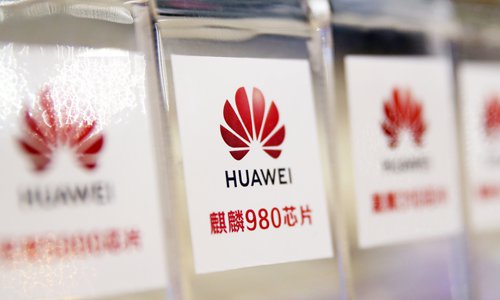Huawei partners with European chipmaker, diversifying supply chains amid US’ crackdown
By Zhang Hongpei and Li Xuanmin Source:Global Times Published: 2020/4/29 18:43:13
Huawei partners with European semiconductor firm

Huawei showcases the Kirin 980 chip along with other devices at the South & Southeast Asia Commodity Expo and Investment Fair in Kunming, Southwest China's Yunnan Province in June, 2019. Photo: IC
Chinese technology giant Huawei Technologies is working with French-Italian chipmaker STMicroelectronics (STMicro) to design chips for mobile devices and autonomous vehicles, a move industry analysts said will help secure its global supply chain as the US tightens export controls on the company.
The collaboration with STMicro, which began in 2019, will accelerate Huawei's autonomous driving development, the Nikkei Asian Review reported Tuesday. The collaboration has not been announced publicly.
"It's a good thing for both sides as many European semiconductor manufacturers have been battered by the fallout from COVID-19. Some of them have lost competitiveness in the global market, so forming a partnership with Huawei will ameliorate their financial woes," Xiang Ligang, a veteran telecoms industry analyst in Beijing, told the Global Times on Wednesday.
Geng Bo, vice secretary-general of the China Solid State Lighting Alliance, a semiconductor industry association, said self-driving automotive chips will be the next battleground for Huawei, leveraging its depth of technology.
STMicro has advantages in making automobile chips and it is the supplier for key chipsets to clients like Tesla.
While Huawei has insisted that it will not manufacture cars, its ambition of utilizing advanced information and communications technology to develop connected vehicles has been explicit in the past few years.
The new tie-up also mirrors Huawei's latest strategy to diversify its supply chains, in a bid to be prepared for a harsher assault from the US government that may cut the Chinese tech company off supplies from Taiwan-based Semiconductor Manufacturing Company (TSMC).
"The strategy is one of not putting all your eggs in the same basket," Xiang said.
Huawei is gradually shifting parts of its chip production from TSMC to the Shanghai-based SMIC as part of broad efforts to get ready for a more relentless US crackdown, according to industry insiders.
Xiang suggested that Huawei and STMicro cooperate in a number of fields including chip design and manufacturing. "The European chipmaker could buy more lithography machines to scale up Huawei's chip production. Chips produced by joint efforts can be sold not only in Europe but also globally," Xiang said.
TSMC, a major producer of chips for Huawei and Apple, is being put in crosshairs of the US Trump administration as it considers changing US regulations to allow it to block shipments of TSMC-made chips to Huawei.
"The US' restrictions will become a long-term normal, not only aimed at Huawei, but also the rising Chinese semiconductor sector," Geng said.
The US said on Monday it will impose new restrictions on exports to China from non-US companies that use products based on US-developed chipmaking equipment to keep semiconductor production equipment and other technologies away from China's military, Reuters reported. "The new rules will require licenses for US companies to sell certain items to companies in China that support the military, even if the products are for civilian use."
The Chinese tech giant was put onto a trade blacklist by the US citing so-called national security concerns last May, and since then, the Chinese semiconductor industry has been making all-out efforts to boost self-grown competitiveness in chips production.
Huawei's HiSilicon has surpassed US chip giant Qualcomm, the long-time market leader, becoming the largest chips supplier to smartphones in China's mainland market, with shipments of 22.21 million processors in the first quarter this year, according to a report by Chinese research firm CINNO on Tuesday.
"Thanks to the nation's strong support, the domestic semiconductor sector has grown rapidly and got to grips with key technologies like memory chips," said Geng, adding that driven by 5G network technologies, the number of start-ups that are producing base station chips has risen rapidly.
Newspaper headline: Huawei partners with European semiconductor firm
Posted in: COMPANIES